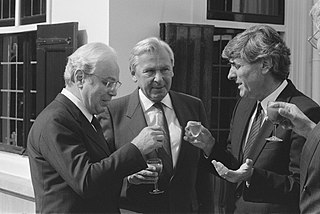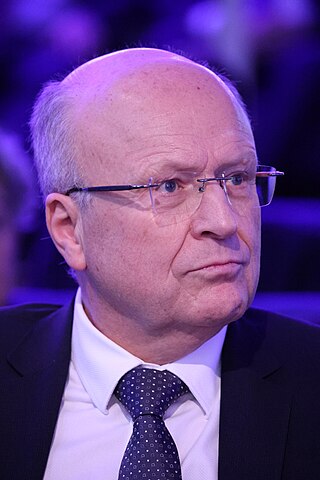
Heidelberg University, officially the Ruprecht Karl University of Heidelberg, is a public research university in Heidelberg, Baden-Württemberg, Germany. Founded in 1386 on instruction of Pope Urban VI, Heidelberg is Germany's oldest university and one of the world's oldest surviving universities; it was the third university established in the Holy Roman Empire after Prague (1347) and Vienna (1365). Since 1899, it has been a coeducational institution.

The Gottfried Wilhelm Leibniz Prize, or Leibniz Prize, is awarded by the German Research Foundation to "exceptional scientists and academics for their outstanding achievements in the field of research". Since 1986, up to ten prizes have been awarded annually to individuals or research groups working at a research institution in Germany or at a German research institution abroad. It is considered the most important research award in Germany.

Carl-August Fleischhauer was a judge at the International Court of Justice, of which he was a member from 6 February 1994 to 2003. He studied legal science in Heidelberg, Grenoble, Paris and Chicago. He was married and had two daughters.
Georg Nolte is a German jurist and Judge of the International Court of Justice. He is professor of public international law at the Humboldt University of Berlin and has been a member of the UN's International Law Commission from 2007 to 2021, serving as its chairman in 2017. In November 2020 he was elected Judge of the International Court of Justice by the United Nations General Assembly and the Security Council, and he took office on 6 February 2021.

Koen Lenaerts, Baron Lenaerts is a Belgian jurist and the President of the Court of Justice of the European Union. He is also a Professor of European Law at the Katholieke Universiteit Leuven and was a member of the Coudenberg group, a Belgian federalist think tank.
Rüdiger Wolfrum is a German jurist and the current professor of international law at the Heidelberg University Faculty of Law and director emeritus of the Heidelberg Max Planck Institute for Comparative Public Law and International Law. Wolfrum was a judge at the International Tribunal for the Law of the Sea from 1996 to 2017, serving as president of the court from 2005 to 2008.

The Heidelberg University Faculty of Law, located in Heidelberg, Germany, is one of the original four constituent faculties of Heidelberg University. Founded in 1386 by Rupert I, Elector Palatine, it is the oldest law school in Germany.

The Max Planck Encyclopedia of Public International Law (MPEPIL) is an online encyclopedia dealing with international law. It was published under the auspices of Professor Rüdiger Wolfrum, Director of the Max Planck Institute for Comparative Public Law and International Law until his successor Anne Peters became general editor in 2021. The initiative to compile the MPEPIL began in 2004 and the online version launched in September 2008. It represents a new edition of the Encyclopedia of Public International Law published between 1991 and 2001 by Rudolf Bernhardt. In February 2012, the print edition was published by Oxford University Press. The encyclopedia is peer reviewed.
Juliane Kokott is the German Advocate General at the Court of Justice of the European Union (CJEU) and Professor at the University of St. Gallen.
Xhezair Zaganjori is an Albanian lawyer and judge. He has served as the President of the Supreme Court of Albania since April 2013, after the termination of his term as a member of the Constitutional Court of Albania.
Hans-Peter Kaul was a German international law scholar and former diplomat and lawyer. From 11 March 2003 until 1 July 2014, he served as Judge at the International Criminal Court in The Hague. At the ICC, Kaul was President of the Pre-Trial Division from 2004 until March 2009 and again in 2014, and he was the Court's Second Vice-President from 2009 to 2012. In 2014, he resigned from the ICC for health reasons but his condition became worse and he died on 21 July 2014.

Armin von Bogdandy is a German legal scholar. He is director of the Max Planck Institute for Comparative Public Law and International Law in Heidelberg and Professor for Public Law, European Law, and International and Economic Law at the Goethe University Frankfurt. Armin von Bogdandy's research centers on the structural changes affecting public law, be they theoretical, doctrinal, or practical.
Andreas L. Paulus is a German jurist who has been serving as a Judge on the Federal Constitutional Court of Germany since 2010. He held the chair of general international law at the University of Göttingen. His research interests include international law, humanitarian law, and constitutional law.
Angelika Helene Anna Nußberger is a German professor of law and scholar of Slavic studies, and was the judge in respect of Germany at the European Court of Human Rights from 1 January 2011 to 31 December 2019; from 2017 to 2019 she was the Court’s Vice-President. She had previously been Vice-Rector of the University of Cologne. Currently she is Director of the Institute of Eastern European Law and Comparative Law of the University of Cologne.

Karl A. Lamers is a German politician of the Christian Democratic Union (CDU) who served as a member of the German Parliament from 1994 until 2021. From 2010 to 2012 he was the President of the NATO Parliamentary Assembly.
Thomas Giegerich is a German jurist. He is professor for European law, international law and public law at Saarland University and director of the Europa-Institut, Saarbrücken.
Torsten Stein was a German jurist. He was the holder of the Chair of European Law and European Public Law at Saarland University as well as the Director of the Europa-Institut, Law Department of Saarland University from 1991 to 2012.

Silja Vöneky is a German jurist, specializing in international law and philosophy of law. She is a professor of public law, international law, and ethics of law at the University of Freiburg.
Anne Peters is a German-Swiss jurist with a focus on public international law. She is director at the Max Planck Institute for Comparative Public Law and International Law, honorary professor at the University of Basel, University of Heidelberg and Free University of Berlin, and at William W. Cook Global Law Professor at Michigan Law School.

Hermann Mosler was a German legal academic and judge. Mosler was a judge at the European Court of Human Rights from 1959 to 1980 and at the International Court of Justice from 1976 to 1985. Additionally, Mosler was the head of the Max Planck Institute for Comparative Public Law and International Law in Heidelberg. He graduated with a doctorate in law from the University of Bonn in 1934.









